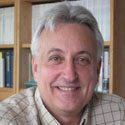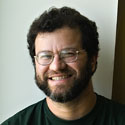Advisory Board and Editors Biosphere Interactions

Alexandre Anesio
Alexandre Magno Anesio is a Professor of Biogeochemistry in the School of Geographical Sciences at the University of Bristol. He is also the Director for the Bristol Glaciology Centre. Anesio gained his PhD in 2000 from Sweden and came to the UK as a Marie Curie postdoctoral fellow in 2003. His research interests are broad, and he combines concepts from Geography, Biology and Chemistry to understand the carbon and nutrient cycle in the cryosphere. In the past 14 years, Anesio has conducted fieldwork in the Arctic, including on the Greenland Ice Sheet and Greenland glaciers (e.g., Kangerlussuaq, Zackenberg, Tassilaq) to demonstrate the impact of microbial processes on a) albedo reduction, b) production, accumulation and export of organic carbon and nutrients to downstream ecosystems and c) the diversity and biogeochemical cycles of subglacial environments. He has secured grants as PI from a variety of sources which includes the UK Research Council (NERC), UK Charities (e.g., Leverhulme Trust, Nuffield Foundation) and the EU (Marie Curie Fellowship and Innovative Training Network). Anesio was elected the 2016 Distinguished Lecturer by the European Geochemistry Association.

Donald J Baird
Research Scientist in the Water Science & Technology Directorate of Environment and Climate Change Canada, Visiting Research Professor in the Biology Department at the University of New Brunswick and Science Director of the Canadian Rivers Institute.
His primary research interests include the study of watershed patterns in aquatic biodiversity and the influence of landscape stressors on resident biota. Current research concerns freshwater invertebrates, with dragonflies as a particular focus. He has previously worked on a variety of taxa groups from flatworms to fish, and in a variety of habitats from wetlands, lakes and rivers to coastal marine systems.

Teri Balser
Professor Teri Balser is Dean of Teaching and Learning for the Faculty of Science and Engineering at Curtin University, where she came after having been Dean of the College of Agricultural and Life Sciences at the University of Florida. She received a Ph.D. in soil microbiology came from the University of California at Berkeley, and she completed postdoctoral research in ecosystem ecology at Stanford University. She is a Fellow of the Soil Science Society of America, and was recently named to the Australian Research Council College of Experts.
Her research centers on understanding microbial community-level ecophysiological responses to stress, disturbance, and change, and the consequences of these for ecosystem functioning. She has worked in countries worldwide studying restoration, carbon sequestration, invasive species, biodiversity, and land use/land cover.
In addition to international recognition as an accomplished research scholar, Dr. Balser is widely known in higher education as a change agent and leader in Science, Technology Engineering and Math education (STEM). She is a co-founder of the Society for Advancement of Biology Education Research (SABER), a National Vision and Change Fellow with the Partnership for Undergraduate Life Sciences Education (PULSE), and was a Fulbright-Nehru Distinguished Chair to India in 2015 to help build capacity at the national level for pedagogically advanced and responsive STEM education.

Michael Beman
The overarching goal of my research program is to develop a predictive understanding of microbial ecology and biogeochemistry in the ‘Anthropocene’ sea. My research sits at the interface of microbial ecology, biogeochemistry, and global change science, and I work worldwide in reefs and estuaries, marine lakes and mountain lakes, and the open ocean. I focus on the responses of microbial communities, and the processes mediated by these communities, to environmental change—including climate change, ocean acidification, and ocean deoxygenation.
I received a B.S. from Yale University and a Ph.D. from Stanford in Geological and Environmental Sciences; before joining the UC Merced faculty in 2009, where I was a postdoc in Marine Environmental Biology at USC, a lecturer at UCLA, and an Assistant Researcher at the University of Hawai’i. I am an Associate Professor and member of the Sierra Nevada Research Institute and the Environmental Systems and Quantitative and Systems Biology graduate groups.

Simon Man Kit Cheung
Dr. Cheung is a Senior Research Associate of the School of Earth Sciences at the University of Bristol. He is a microbial ecologist specialized in using molecular and bioinformatics techniques to examine the dynamics, determinants and roles of microbial communities in natural and host-associated environments.

Robert Costanza
Professor of Ecological Economics, University College London, Institute for Global Prosperity, Senior Fellow, Stockholm Resilience Center, Stockholm, Sweden; Affiliate Fellow, Gund Institute for Ecological Economics, University of Vermont; deTao Master of Ecological Economics, deTao Masters Academy, Shanghai China

Andrea Cucco
Andrea Cucco is a scientist in physical oceanography at the Institute of Coastal Marine Environment of the Italian National Research Council. He is focused on numerical modeling and, specifically, on the development and application of hydrodynamic and environmental models based on the finite elements methods. His research activity and scientific production is highly interdisciplinary and related to several aspects of the oceanography including the reproduction of the sea currents and wind waves in coastal and near-shore areas, the transport and diffusion processes occurring at the sea surface as well the interactions between the physical environment and the marine ecosystem. He is involved in several research initiatives aimed to predict the risk and the danger coming from the potential and accidental release of hydrocarbons in the marine environment. PhD in Marine Environmental Science at Ca’ Foscari University in Venice, Member of IAPSO from 2016.

Jorge Curiel Yuste
Dr. Jorge Curiel Yuste, leads the group of "Terrestrial Ecology" within the BC3. He obtained his doctorate from the University of Antwerp (UA, Belgium) in 2004. Since then, he has been a postdoctoral researcher at the Biometeorology (Biometlab) lab at the University of California, Berkeley (Prof. Dennis D Baldocchi, 2004-2007) a Marie Curie fellow (Intra-European Fellowship (IEF)) in the Global Ecology Unit at the Centre for Ecological Research and Forestry Applications (CREAF) of Barcelona (2007-2009), a postdoctoral researcher at the Autonomous University of Barcelona (UAB; Contractes doctoral D'Intensificatió I3, 2009-2011) and a "Ramón y Cajal" research fellow at the Museum of Natural History (MNCN, CSIC). Since 2017 he holds an Ikerbasque Research Professorship at the Basque Center for Climate Change (BC3). At the moment he is also responsible for the group of "Plant and soil Interactions" (PlanSoil within the Asociaciión Española de Ecología Terrestre (AEET)

Janendra De Costa
Janendra De Costa is the Senior Professor and Chair of Crop Science at the University of Peradeniya in Sri Lanka. In his research, Prof. De Costa explores the interactions between plants and their environment. In particular, he is interested in unravelling the influence of climate on the functioning (i.e. physiology) of plants, their growth and productivity. His research has spanned across a range of agricultural crops in agro-ecosystems and natural plant species in forest ecosystems, with a special focus on climate change and its impacts on agricultural crops and tropical rainforests, their climate and soils. Prof. De Costa’s research has been predominantly empirical, strongly based on quantitative observations in the field and data analysis to build relationships, with a limited amount of simulation modelling and molecular biology.
As part of his interactions with the wider scientific community at the national level, Prof. De Costa takes an interest in policy formulation and funding for scientific research and development. He has served in national level research funding agencies, policy formulating bodies, editorial boards, governing boards and research monitoring and evaluation committees of national agencies. Currently, he functions as the Chairperson of the Consultative Committee for Research of the Tea Research Institute of Sri Lanka and is a member of the governing board of the Sugarcane Research Institute of Sri Lanka. As part of his social responsibility as a scientist, Prof. De Costa writes regularly to national newspapers on topical issues with a view to increasing scientific literacy and awareness among the general public.

Peter Dunfield
Professor, Biological Sciences, University of Calgary. Alberta Ingenuity New Faculty. Formerly Senior Scientist, Extremophile Research Group, Institute for Geological and Nuclear Sciences, New Zealand, and Research Group Leader, Max-Planck Institute for Terrestrial Microbiology, Marburg, Germany

Jonathan A Eisen
Full Professor, University of California, Davis (Depts. of Medical Microbiology and Immunology and Evolution and Ecology) and Adjunct Scientist DOE Joint Genome Institute.
Obsessed with microbes, the Redsox, open science, and STEM diversity.

Igor V. Florinsky
Igor Florinsky is a Principal Research Scientist at the Keldysh Institute of Applied Mathematics, Russian Academy of Sciences. He is an author, co-author, or editor of over 140 publications including 3 books, 2 edited volumes, 55 papers in peer-reviewed journals, and 15 peer-reviewed book chapters. His research interests include digital terrain modeling and geomorphometry, interrelationships between topography, soils, and tectonics, and the influence of the geological environment on humans, society and civilization.

